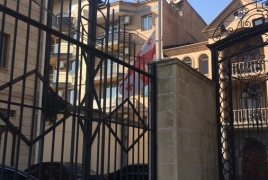
Armenian alcohol producers and exporters staged a protest outside the Georgian Embassy in Yerevan, voicing concerns over prolonged delays in transporting goods to Russia.
The demonstrators allege that Georgian authorities are imposing additional laboratory checks on Armenian products, causing trucks to be held at the border for weeks.
One protester stated, "For a month now, none of our trucks have passed through Georgia to Russia. All vehicles are detained in the economic registration zone. We lack answers to our pressing questions, which is why we've gathered here today. This situation cannot continue; our government must leverage its tools to influence the current circumstances," as reported by Sputnik Armenia.
The protesters argue that these measures have inflicted significant damages not only on producers but also on exporting and transportation companies. They gathered in front of the embassy seeking clarifications and demanding a resolution to the issue.
The Ministry of Economy acknowledged awareness of the concerns raised by the business community. "The matter is under our close attention; moreover, daily intensive efforts are underway to find a systemic solution," the ministry stated.
During the protest, an embassy staff member approached the demonstrators, requesting a list of companies affected by the export issues. The employee recorded several company names before returning inside.
Despite this interaction, the protesters temporarily blocked the road leading to the embassy, holding Armenian and Georgian flags, along with a banner reading "Hands off the Armenian producer."
Later, it was reported that two participants of the protest met with the Georgian Ambassador to Armenia. Ambassador Giorgi Sharvashidze conveyed that the concerns raised had been communicated to Georgia, and an official statement from Tbilisi is expected soon.
Previously, a similar issue arose with flower exporters, which was resolved through active involvement of the Ministry of Economy. Additionally, companies engaged in brandy production have been informed about receiving credit deferrals due to complications in the Russian market.

